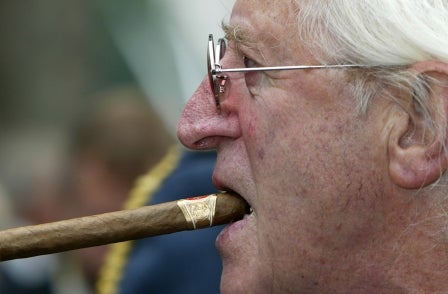
Former Sunday Mirror editor Paul Connew has revealed that the paper did not expose Jimmy Savile as a serial child sex offender in 1994 because it could not afford to lose a libel trial.
Connew said the paper would have lost a defamation trial with Savile partly because the two victims who came to him, from Duncroft school, did not want to be named.
The editor, who believed their stories, also said the paper would have lost because, at the time, libel trials were overseen by juries who were likely to have been “starstruck” by Savile.
“In truth, at the time, post-Maxwell, the Sunday Mirror had limited resources [and] we were having to lose staff,” he said, at a Centre for Investigative Journalism lecture held at City University, London.
Connew pointed out that the paper did not have evidence of how widespread the allegations were at the time. “We just didn’t have the resources or the evidence to mount an investigation,” he said.
He also dismissed the possibility of launching an undercover investigation because of Savile’s apparent taste for young girls. Connew said: “You couldn’t [use] a child of the age that Savile was seen to prefer and you couldn’t find a journalist who would fit that bill.”
The lecture also saw freelances Mark Williams-Thomas and Miles Goslett talk about how they had played their parts in exposing Savile and the BBC’s spiking of a Newsnight documentary on him.
The event was chaired by Gavin Millar QC, who suggested that the Reynolds responsible journalism defence, introduced in 2000, should have helped newspapers to expose Savile before his death.
He said, in the Sunday Mirror case, it would have enabled the paper to air the allegations in the public interest and not have required victims to give evidence in court.
But he admitted that there remains a “massive amount of scepticism” in the media on the reliability of Reynolds.
Asked by Press Gazette whether the Reynolds defence would have helped the Sunday Mirror bring the story into the open 19 years ago, Connew said he thought Millar was “overselling” the defence.
“In theory Gavin was absolutely right, but as he then acknowledged there hadn’t really been a really good test of the Reynolds defence,” he said.
“I think what Gavin was not looking at either was the fact that Reynolds defence is fine in theory and it’s probably easier now… that it’s almost unheard of to get a libel jury.
"But back in ’94 … you would have still had the issue that a starstruck jury would have been impressed by Savile’s protestations and the fact that we were actually not producing two frightened women in the witness box."
He added: “I don’t think the Reynolds defence in ’94 would not have made a practical difference.”
A new responsible journalism defence was put on the statute book by the passing of the Defamation Act 2013 earlier this year.
It replaces the Reynolds defence and states that defendants must show that they "reasonably believed that publication was in the public interest" to be able to make use of it.
Email pged@pressgazette.co.uk to point out mistakes, provide story tips or send in a letter for publication on our "Letters Page" blog
